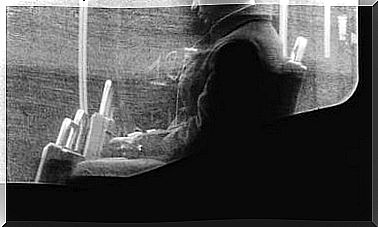What You Do And Say Creates Your Reality
Our thoughts, experiences, attitude and words shape the brain and affect how it operates in the future. How to overcome the limits that our mind imposes?

Ever since Watson and Crick discovered DNA and how it somehow ends up making us who we are, there has been a lot of hype surrounding new discoveries about the human genome.
It seemed logical that if the DNA was in the nucleus, this would be the “cellular brain”. However, even homozygous twins (who share exactly the same DNA sequence) do not display the same character or suffer from the same diseases. What had escaped us?
The cell membrane: a sensitive “brain”
Around the cell’s cytoplasm, where the cell’s “powerhouse” called mitochondria is located, up to the granular endoplasmic reticulum, where the proteins determined by DNA are made, there is the so-called cell membrane.
So that we are aware of its importance: you can remove the nucleus from a cell without the cell dying; It will not be able to synthesize new proteins or reproduce, but it will live for many more days. On the contrary, if we remove the membrane, the cell dies immediately.
This is in contact with all the chemical substances that travel through the blood : from the so-called “molecules of emotion” to elements of the external environment that have penetrated our body.
Today it is increasingly clear that the true “brain” of the cell is not in the nucleus, but in the membrane. And this is tremendously sensitive to the environment in which you live.
There are molecules that, either acting indirectly through the membrane or having a direct action on the nucleus, cause certain genes to be expressed or not. Thus, our habitual state of mind could favor the expression of some genes and not that of others. Therefore, we have something to say when it comes to preventing a disease from arising and also when it comes to fighting it.
How do we act on the cell membrane?
When a person has become accustomed to living trapped in a certain personality, they have also been confined to living in a kind of box, which we call a “comfort zone ”.
Within this, we have become accustomed to thinking in a way, to feeling in a way and to having a certain chemistry in our blood when starting emotions that are only the reflection of an already established way of thinking and feeling. Many of these emotions are nothing more than automatic response patterns, which we have reinforced over and over again over the years.
There are people who react immediately with anger at the slightest provocation, or who experience deep feelings of guilt every time something painful happens, even if they have nothing to do with it. The cells of these bodies are continually subjected to this barrage of hormones related to anger or guilt.
The membrane will need to develop a greater number of receptors in front of so many molecules. The cell itself adjusts to this chemical environment, which could have an impact on how it will function, on which genes it will express and on which it does not.
As we can influence cells, we are active agents when it comes to fighting or avoiding diseases.
After a long time immersed in a certain chemical environment, they come to need these molecules to continue to be present in their environment; the body in a certain way demands its “dose” of a certain hormone and thus makes it known to the brain, through the maps of feelings. We are talking, therefore, of a form of “addiction.”
How to change these patterns of thinking and feeling?
Automatisms are not easy to stop because they are not only preferential channels in the brain, but also in cells. That is why certain types of stimulus find a resonance, such a great echo in every corner of the body. Fortunately, the cell membrane is plastic and malleable, like brain circuits: it has the ability to adapt to the chemical environment in which it lives.
They reproduce and, if they see that this chemical environment has changed, they will respond with changes in its function. That is why it is so important to consider the impact that expanding our identity – so that it is not so narrow and limited – can have on our health and vitality. When we change the mental programs that limit us the most for others, we modify the cellular structure.
Thought patterns, feelings and the cellular chemical environment feed back in a cyclical way.
This could also serve to explain why certain changes in nutrition, physical exercise, and the way we breathe can affect the way people think, feel, and perceive. By altering the chemical environment in which the cell is found, transformations occur in the membrane and in cell function.
From that moment on, these cells would show resistance to the brain changing the molecules that predominate in its environment again. That is why we have to develop patience with ourselves and with others when it comes to change processes.
The role of language
This is a second mechanism by which the impostor identity alters our state of mind. Language not only describes, but also creates our reality. Words open “emotional drawers”, according to the experiences we associate with those words.
What we say has enormous power over the type of experience we create. Through our interpretations and evaluations of those things that happen to us, we are generating certainties and convictions that, little by little, are shaping our identity, our personality. These convictions installed at the unconscious level become the reference points when determining what the meaning that we are going to give to certain events will be.
The language is so extremely powerful that it is enough for a person to change, for example, the phrase “this is something frightening” for “this is inconvenient” for him to notice, even slightly, a change in his emotional world.
Words are not carried away by the wind. Let’s use them with intention. We may be surprised at what starts to happen.
We call “transformational language” that which has by itself the ability to affect emotions and also moods. Some scientific studies have been done to measure the impact that words have on our physiology.
Knowing how cortisol is associated with very profound changes in the functioning of the brain and the body, we cannot continue to ignore that using words full of negativity over and over again will not only not help us solve problems; on the contrary, it is going to make it even more difficult.
We can use words to start transforming ourselves. Where do we start?
How do you say it
It is about modulating the words we use, rather than banishing negative words from the vocabulary. Saying something is impossible does not have the same effect as telling you that something is improbable.
How do you interpret it
Since all experience is the integration of a fact, an emotion and an assessment, we alter our experiential memories when we change the way we interpret what happens.
What you believe
Let us be cautious with the type of words we use and the type of evaluations we generate to prevent them from stealing our personal power and causing us unnecessary suffering.









